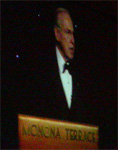
Security expert Bruce Schneier writes about the reality of National ID cards:
The potential privacy encroachments of an ID card system are far from minor. And the interruptions and delays caused by incessant ID checks could easily proliferate into a persistent traffic jam in office lobbies and airports and hospital waiting rooms and shopping malls.
But my primary objection isn’t the totalitarian potential of national IDs, nor the likelihood that they’ll create a whole immense new class of social and economic dislocations. Nor is it the opportunities they will create for colossal boondoggles by government contractors. My objection to the national ID card, at least for the purposes of this essay, is much simpler:
It won’t work. It won’t make us more secure.







